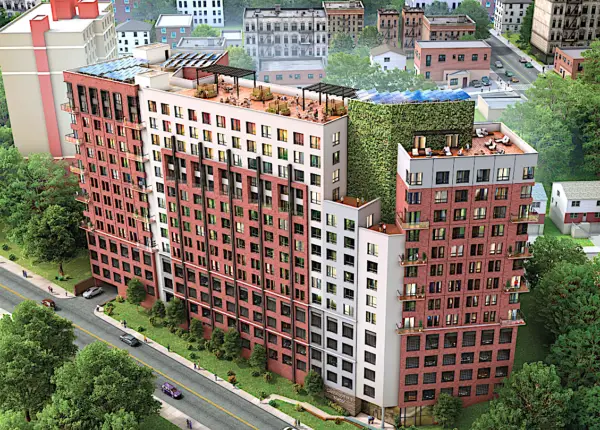$79M apartment building proposed for city-owned land in Yonkers
A team of developers hopes to be able to buy 15 lots from the city of Yonkers this coming January so that it can move ahead with a plan to build a 14-story building that would have 177 apartments, all priced in the affordable category. The developers are Lemor Development LLC and Empire Development Capital Holding LLC.
Lenor, Empire and the city have a nonbinding Letter of Intent that would have the city selling the lots for a price to be determined through an appraisal process. The properties are at 297 Glenwood Ave. and 146 and 164 Lake Ave. The properties currently are vacant and when combined would create a site of just over 0.9 acres in size.
The proposed building would cost an estimated $79 million to construct, not including the land cost. The total height would be 176 feet and there would be parking on the first through fourth floors for 138 vehicles, in addition to space for building mechanicals and a gymnasium for residents. Floors five through 14 would be for the apartments.
The development would be known as Glenwood Hill Manor. There would be 10 studios, 70 one-bedroom units, 77 two-bedroom apartments and 20 three-bedroom units. The units would be priced to be affordable to people earning from 40% to 80% of the area median income for Westchester County.

The proposed building site is along the northwestern side of Father Finian Sullivan Drive and the southeastern side of Somerville Place. Nearby are Finian Sullivan Tower, which is a 13-story affordable housing development, and Monastery Manor, which is a 12-story affordable housing development.
Attorney Neil Alexander of the White Plains-based law firm Cuddy & Feder told the Yonkers Planning Board that Lermor Development “focuses on transforming underserved communities and enhancing living standards by acquiring, preserving, constructing and managing quality and sustainable workforce and affordable housing, while also establishing strategic partnerships with other minority developers, contractors and suppliers.” He said that the company was formed by Kenneth Morrison, company president, and Harrison Rayford, who is its director of acquisitions.
“Lemor has a strong commitment to reducing the critical shortage of affordable housing,” Alexander told the board. “It also simultaneously works to positively impact the lives of tenants beyond the four walls. Lemor further seeks to inspire and grow minority firms as a diverse and socially aware developer.”
Lemor traces its roots to the mid-1960s when Leroy Morrison, father of Kenneth Morrison, started purchasing property in Harlem. The company has specialized in rehabilitating existing housing stock as well as building new mixed-use, mixed-income and affordable housing.
In October of last year, TruFund Financial Services Inc., a Community Development Financial Institution located in New York City, announced that it had made an equity investment in Lemor, which TruFund described as “a Black-owned real estate firm that specializes in the development and management of affordable and workforce housing.” The equity investment was to allow Lemor “to leverage increased liquidity, fund affordable/workforce housing project development and grow internal capacity.”
Alexander described the other entity in the Yonkers development, Empire Development Capital Holding, as “a real estate consulting and development company based out of the New York City area with a focus on multifamily residential affordable housing projects.” He said that company founder Donell Leverett has more than 15 years”™ experience in the affordable housing industry and worked for the New York City Department of Housing Preservation and Development and a variety of community development corporations.
The Yonkers Planning Board will be handling the environmental review of the project. In addition to merging the various lots into a single tax lot, the developer is asking that the Yonkers City Council rezone the site from the current M zone that allows medium-density apartments to the A zone that allows high-density apartment buildings.
Alexander said that remapping of the property to the A zone is consistent with the immediately adjacent Monastery Manor Tower and a means to minimize the number and intensity of area variances required for the project.
The developer had a parking analysis prepared that concluded the number of proposed parking spaces is sufficient considering that the supply exceeds that of other, similar facilities, and that all of the spaces at the other facilities are not fully utilized.
According to Alexander, the applicants hope that in the third quarter of this year the Planning Board will reach a conclusion regarding environmental impacts and that the City Council will adopt the requested rezoning. They further hope that in the fourth quarter of the year, the Planning Board and Zoning Board of Appeals will handle the site plan and area variance reviews, hold public hearings, and grant necessary approvals.